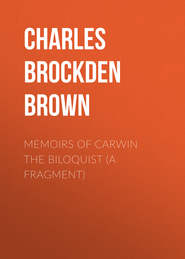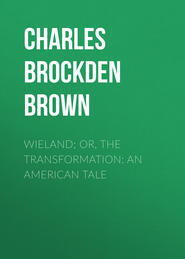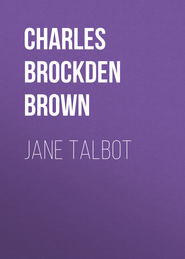По всем вопросам обращайтесь на: info@litportal.ru
(©) 2003-2024.
✖
Ormond; Or, The Secret Witness. Volume 1 (of 3)
Настройки чтения
Размер шрифта
Высота строк
Поля
When the day's task was finished, jaded spirits, and a body enfeebled by reluctant application, were but little adapted to domestic enjoyments. These indeed were incompatible with a temper like his, to whom the privation of the comforts that attended his former condition was equivalent to the loss of life. These privations were still more painful to his wife, and her death added one more calamity to those tinder which he already groaned. He had always loved her with the tenderest affection, and he justly regarded this evil as surpassing all his former woes.
But his destiny seemed never weary of persecuting him. It was not enough that he should fall a victim to the most atrocious arts, that he should wear out his days in solitude and drudgery, that he should feel not only the personal restraints and hardships attendant upon indigence, but the keener pangs that result from negligence and contumely. He was imperfectly recovered from the shock occasioned by the death of his wife, when his sight was invaded by a cataract. Its progress was rapid, and terminated in total blindness.
He was now disabled from pursuing his usual occupation. He was shot out from the light of heaven, and debarred of every human comfort. Condemned to eternal darkness, and worse than the helplessness of infancy, he was dependant for the meanest offices on the kindness of others; and he who had formerly abounded in the gifts of fortune, thought only of ending his days in a gaol or an almshouse.
His situation however was alleviated by one circumstance. He had a daughter whom I have formerly mentioned, as the only survivor of many children. She was sixteen years of age when the storm of adversity fell upon her father's house. It may be thought that one educated as she had been, in the gratification of all her wishes, and at an age of timidity and inexperience, would have been less fitted than her father for encountering misfortune; and yet when the task of comforter fell upon her her strength was not found wanting. Her fortitude was immediately put to the test. This reverse did not only affect her obliquely, and through the medium of her family, but directly, and in one way usually very distressful to female feelings.
Her fortune and character had attracted many admirers. One of them had some reason to flatter himself with success. Miss Dudley's notions had little in common with those around her. She had learned to square her conduct, in a considerable degree, not by the hasty impulses of inclination, but by the dictates of truth. She yielded nothing to caprice or passion. Not that she was perfectly exempt from intervals of weakness, or from the necessity of painful struggles, but these intervals were transient, and these struggles always successful. She was no stranger to the pleadings of love from the lips of others, and in her own bosom; but its tumults were brief, and speedily gave place to quiet thoughts and steadfast purposes.
She had listened to the solicitations of one not unworthy in himself, and amply recommended by the circumstances of family and fortune. He was young, and therefore impetuous. Of the good that he sought, he was not willing to delay the acquisition for a moment. She had been taught a very different lesson. Marriage included vows of irrevocable affection and obedience. It was a contract to endure for life. To form this connection in extreme youth, before time had unfolded and modelled the characters of the parties, was, in her opinion, a proof of pernicious and opprobrious temerity. Not to perceive the propriety of delay in this case, or to be regardless of the motives that would enjoin upon us a deliberate procedure, furnished an unanswerable objection to any man's pretensions. She was sensible, however, that this, like other mistakes, was curable. If her arguments failed to remove it, time, it was likely, would effect this purpose. If she rejected a matrimonial proposal for the present, it was for reasons that might not preclude her future acceptance of it.
Her scruples, in the present case, did not relate to the temper or person, or understanding of her lover; but to his age, to the imperfectness of their acquaintance, and to the want of that permanence of character, which can flow only from the progress of time and knowledge. These objections, which so rarely exist, were conclusive with her. There was no danger of her relinquishing them in compliance with the remonstrances of her parents and the solicitations of her lover; though the one and the other were urged with all the force of authority and insinuation. The prescriptions of duty were too clear to allow her to hesitate and waver; but the consciousness of rectitude could not secure her from temporary vexations.
Her parents were blemished with some of the frailties of that character. They held themselves entitled to prescribe in this article, but they forbore to exert their power. They condescended to persuade, but it was manifest that they regarded their own conduct as a relaxation of right; and had not the lever's importunities suddenly ceased, it is not possible to tell how far the happiness of Miss Dudley might have been endangered. The misfortunes of her father were no sooner publicly known, than the youth forbore his visits, and embarked on a voyage which he had long projected, but which had been hitherto delayed by a superior regard to the interests of his passion.
It must be allowed that the lady had not foreseen this event. She had exercised her judgment upon his character, and had not been deceived. Before this desertion, had it been clearly stated to her apprehension, she would have readily admitted it to be probable. She knew the fascination of wealth, and the delusiveness of self-confidence. She was superior to the folly of supposing him exempt from sinister influences, and deaf to the whispers of ambition; and yet the manner in which she was affected by this event convinced her that her heart had a larger share than her reason in dictating her expectations.
Yet it must not be supposed that she suffered any very acute distress on this account. She was grieved less for her own sake than his. She had no design of entering into marriage in less than seven years from this period. Not a single hope, relative to her own condition, had been frustrated. She had only been mistaken in her favourable conceptions of another. He had exhibited less constancy and virtue than her heart had taught her to expect.
With those opinions, she could devote herself with a single heart to the alleviation of her parent's sorrows. This change in her condition she treated lightly, and retained her cheerfulness unimpaired. This happened because, in a rational estimate, and so far as it affected herself, the misfortune was slight, and because her dejection would only tend to augment the disconsolateness of her parents, while, on the other hand, her serenity was calculated to infuse the same confidence into them. She indulged herself in no fits of exclamation or moodiness. She listened in silence to their invectives and laments, and seized every opportunity that offered to inspire them with courage, to set before them the good as well as the ill to which they were reserved, to suggest expedients for improving their condition, and to soften the asperities of his new mode of life, to her father, by every species of blandishment and tenderness.
She refused no personal exertion to the common benefit. She incited her father to diligence, as well by her example as by her exhortations; suggested plans, and superintended or assisted in the execution of them. The infirmities of sex and age vanished before the motives to courage and activity, flowing from her new situation. When settled in his new abode and profession, she began to deliberate what conduct was incumbent on herself, how she might participate with her father the burden of the common maintenance, and blunt the edge of this calamity by the resources of a powerful and cultivated mind.
In the first place, she disposed of every superfluous garb and trinket She reduced her wardrobe to the plainest and cheapest establishment. By this means alone she supplied her father's necessities with a considerable sum. Her music, and even her books were not spared, – not from the slight esteem in which these were held by her, but because she was thenceforth to become an economist of time as well as of money, because musical instruments are not necessary to the practice of this art in its highest perfection, and because books, when she could procure leisure to read, or money to purchase them, might be obtained in a cheaper and more commodious form, than those costly and splendid volumes with which her father's munificence had formerly supplied her.
To make her expenses as limited as possible was her next care. For this end she assumed the province of cook, the washing of house and clothes, and the cleaning of furniture. Their house was small; the family consisted of no more than four persons, and all formality and expensiveness were studiously discarded; but her strength was unequal to unavoidable tasks. A vigorous constitution could not supply the place of laborious habits, and this part of her plan must have been changed for one less frugal. The aid of a servant must have been hired, if it had not been furnished by gratitude.
Some years before this misfortune, her mother had taken under her protection a girl, the daughter of a poor woman, who subsisted by labour, and who dying, left this child without friend or protector. This girl possessed no very improvable capacity, and therefore could not benefit by the benevolent exertions of her young mistress so much as the latter desired; but her temper was artless and affectionate, and she attached herself to Constantia with the most entire devotion. In this change of fortune she would not consent to be separated; and Miss Dudley, influenced by her affection for her Lucy, and reflecting that on the whole it was most to her advantage to share with her at once her kindness and her poverty, retained her as her companion. With this girl she shared the domestic duties, scrupling not to divide with her the meanest and most rugged, as well as the lightest offices.
This was not all. She in the next place considered whether her ability extended no farther than to save. Could she not by the employment of her hands increase the income as well as diminish the expense? Why should she be precluded from all lucrative occupation? She soon came to a resolution. She was mistress of her needle; and this skill she conceived herself bound to employ for her own subsistence.
Clothing is one of the necessaries of human existence. The art of the tailor is scarcely less use than that of the tiller of the ground! There are few the gains of which are better merited, and less infurious to the principles of human society. She resolved therefore to become a workwoman, and to employ in this way the leisure she possessed from household avocations. To this scheme she was obliged to reconcile not only herself but her parents. The conquest of their prejudices was no easy task, but her patience and skill finally succeeded, and she procured needlework in sufficient quantity to enable her to enhance in no trivial degree the common fund.
It is one thing barely to comply with the urgencies of the case, and to do that which in necessitous circumstances is best. But to conform with grace and cheerfulness, to yield no place to fruitless recriminations and repinings, to contract the evils into as small a compass as possible, and extract from our condition all possible good, is a task of a different kind.
Mr. Dudley's situation required from him frugality and diligence. He was regular and unintermitted in his application to his pen. He was frugal. His slender income was administered agreeably to the maxims of his daughter: but he was unhappy. He experienced in its full extent the bitterness of disappointment.
He gave himself up for the most part to a listless melancholy. Sometimes his impatience would produce effects less excusable, and conjure up an accusing and irascible spirit. His wife, and even his daughter, he would make the objects of peevish and absurd reproaches. These were moments when her heart drooped indeed, and her tears could not be restrained from flowing. These fits were transitory and rare, and when they had passed, the father seldom failed to mingle tokens of contrition and repentance with the tears of his daughter. Her arguments and soothings were seldom disappointed of success. Her mother's disposition was soft and pliant, but she could not accommodate herself to the necessity of her husband's affairs. She was obliged to endure the want of some indulgences, but she reserved to herself the liberty of complaining, and to subdue this spirit in her was found utterly impracticable. She died a victim to discontent.











